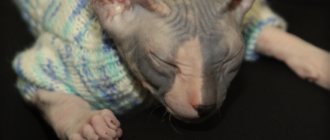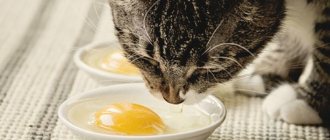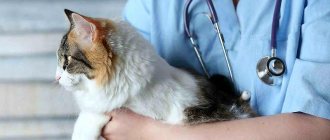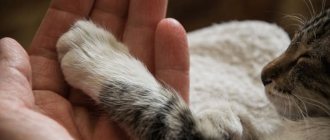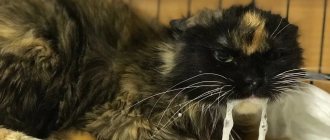Urolithiasis in cats is a serious disease accompanied by the formation of stones and sand in the urinary ducts, bladder, and kidneys. About 25% of domestic cats are at risk for ICD (urolithiasis), and cats are more susceptible to this disease due to their anatomical features. What symptoms should you pay attention to in order not to miss the onset of the disease?
To attract attention
A continuation of infantile behavior associated with the toilet is that sometimes the kitten sits in the litter box and meows for no apparent reason.
He may not even go to the toilet. This problem is often associated with the fact that the cat is either still very small and is looking for food, but does not know where it is, or he attracts your attention - he needs affection or play. And it happens that the kitten plays in the litter box and frowns to itself
In any case, the kitten, firstly, should not be ignored. Instead, try to attract him with something outside the litter box so that the habit of sitting there and calling you doesn't become ingrained. Although most often it goes away on its own with age.
How to help your pet
In most cases, this behavior of cats is completely normal and natural; they do not need any help. When it is difficult for a cat to go to the toilet in a big way (constipation) and he clearly experiences pain or discomfort, you should show him to the veterinarian, as this may be a symptom of some disease. The presence of bloody inclusions in the stool should cause particular concern.
Your cat may be constipated
If everything is in order with the waste products, they have normal consistency and color, then there should be no cause for concern. There is no need to calm your pet before defecation and you should not pay attention to his madness.
How to find the reason?
If your cat begins to meow loudly and continuously, then first of all you should take a closer look and pay attention to the accompanying changes in her behavior.
- If a cat refuses to eat, although the bowl is filled with food, the animal is most likely hungry, but the food offered is not suitable for it.
- If a cat meows after refusing to go to the toilet for a long time, the pet is experiencing digestive upset.
- When a cat's crying is accompanied by a change in behavior, for example, it becomes lethargic or itches frequently, and also if the mucous membranes of its eyes become inflamed and its fur becomes dull, the animal is sick. Only a veterinarian can determine the cause of the disease.
- But if your pet begins to hide behind the furniture, cling to the walls, then he experiences fear - most often this happens when the cat finds itself in a new place of residence or when faced with cruel treatment from people.
- If a cat clings to the radiators and looks for warm places, the animal is frozen. If a furry friend begins to literally follow his owner with his tail, most likely, your friend is hinting that he wants to play with you or get his share of love and affection.
- During sexual hunting, cats begin to mark corners in the house, and cats stand in a “ready pose” and lift their tails.
- Cats are clean animals and will never go into a dirty litter box, so if the animal meows near the toilet, change the litter as soon as possible.
- Older cats often suffer from Alzheimer's disease. In this case, the animal often crashes into walls, stops responding to its name, and can stand in one place for a long time with a blank look, sometimes making loud noises.
What to do?
Methods of dealing with cat meowing directly depend on the reasons that cause it. Keep in mind that felines are primarily nocturnal animals. During the day they like to sleep, and at night they begin to run, rustle with bags, jump and flirt with the owner; if he does not reciprocate, they begin to scream and attack invisible enemies.
If the cat has all the signs of the disease, treatment can only be prescribed by a doctor who will conduct all the necessary examinations and select the necessary medications.
Affection, warmth and a friendly attitude will help you cope with the changed circumstances; if you wish, you can take a course of mild sedatives.
When the cat is cold, try to increase the air temperature in the room, and if this is not possible, arrange a warm house for the pet.
Coping with sexual heat will be much more difficult.
If you are against such radical measures as sterilization and castration, then ask your veterinarian to prescribe drugs that block heat, for example, Sex Barrier or Gestrenol. Keep in mind that they all contain hormones and have many contraindications, so many owners simply “get through” these turbulent days.
When a cat screams, it is strictly prohibited:
- succumb to her provocations - play or feed extra just to keep the pet silent;
- swear or spank the pussy - remember that these animals are very vindictive and “retribution” will not be long in coming;
- pour water on the animal;
- blow in the cat's nose.
To calm your pet you need a strong nervous system and excellent endurance. Try to keep your emotions under control and, even in the most tense moments, do not break down or yell at the cat, much less resort to violence. Only affection, understanding and love will help you cope with the problem and achieve the desired result.
The reasons why a cat may meow are listed in the video below.
Symptoms of pathologies.
If running after the toilet begins to be observed in a cat that has not done this before, this may indicate the emergence of psychological and even physical (even pain) problems. Pain can cause disturbances in the functioning of the digestive system, including the urinary tract. The cause may be kidney disease.
Cats may experience difficulty urinating or defecating, trying to distract themselves from the unpleasant sensations experienced by running. If an attempt to visit the tray fails, chaotic running becomes a manifestation of a reaction of disappointment. If you notice any behavioral changes or signs of illness in your cat, you should contact your veterinarian to have her examined.
What does a cat do most of the day? If you say that she is sleeping, then in the vast majority of cases you will be right. A healthy adult cat can actually sleep up to 16 hours a day.
But sometimes the lazy (at first glance) purr seems to switch on a different mode and she begins to rush madly around the house, from one end of the apartment to the other, sometimes pushing and crushing carpets and rugs and knocking over things that get in her way. Is this normal? What to do about it? “Murkosha”, as always, will give answers.
- 1) Why does the cat most often rush around the apartment?
- 2) How to ensure the safety of things and healthy sleep
- 3) If the cat is alone for a long time
- 4) Health problems
- 5) Sexual instinct
- 6) The cat is trying to wake up the owner
Why does the cat most often run around the apartment?
Some owners believe that the cat is having some kind of “seizure” at this moment. No. In most cases, this is absolutely normal behavior, determined by instincts and lifestyle. Cats rush around the apartment because they are predators, their instincts tell them so. They constantly need to move to keep their body in good shape. In this way they improve their hunting skills. After 5-10 minutes, the cat usually gets tired and lies down to rest. These bursts of activity are completely natural, especially for kittens and young cats.
Sometimes a cat has an additional goal - to attract the attention of the owner. Especially if the owner does not spoil his pet with attention too often. But even if you often play with your cat, even if he has a wide variety of toys, this behavior can still be an invitation to play. All cats have very different habits and preferences, including in games. For some cats, there is nothing better than hide and seek and chase, and this requires at least two. Don't deny your cat attention, at least don't do it too often. Cats are very sensitive animals, and such neglect can cause your pet to become stressed. And stress often leads to various behavioral problems.
If you cannot support games of hide and seek and chase, or such activity is unacceptable for you for some reason, you can redirect the cat’s energy in another direction (more on this below).
So, this behavior in itself is normal - the kitten runs around to let off steam and keep itself in good shape. It’s good when this happens during the day and your things don’t suffer. Then it's even fun to watch. But sometimes this can turn into a problem.
- When a cat rushes around the apartment, he often also jumps to higher places. Often there are already some things in these places, sometimes fragile and valuable. Naturally, these things can fall or even break when the cat jumps.
- Cats are nocturnal animals after all. During the day they rest more. But if by night they have accumulated a lot of excess energy, they will definitely decide to throw it out. The kitten will begin to rush around the apartment, preventing the owners from sleeping. And none of your screams and exhortations will help here, if only because for him such behavior is quite normal in this situation. Locking a kitten somewhere is also not a solution - it will meow loudly and ask to be let out. Put yourself in his place: you are full of strength and energy, thirsty for action, ready to move mountains, but you are told to just sit quietly and not disturb anyone - and nothing else. And so on all the time.
How to ensure the safety of things and healthy sleep
Here you probably have a question: is it possible to make sure that the cat lives a full active life, and things remain safe and sound, and the owners get enough sleep? Of course you can! Moreover, it is not difficult at all.
To begin with, valuable and/or fragile items should be placed out of reach of the cat. When we say “inaccessible,” we do not mean those where the cat “cannot” climb, but those that it cannot reach even if it wants to. This must be done in any case, even if your pet does not like to run and jump too much. Firstly, the mood may change. Secondly, all cats love to explore the territory, and if your pet has not explored something yet, but he has the opportunity, then he will almost certainly eventually do so.
Next, the cat needs to be provided with an alternative. If your cat runs around at night, play with it (perhaps like catch) just before bed. But only so that she gets tired, that is, she lies down and does not show any desire to continue playing. If the cat is not tired enough, it will continue to run around at night. This can be noticed if the pet does not lie down, expects some action from you, looks at you while its pupils are dilated, touches you with its paw, etc. But if you really exhaust your cat, she will sleep without her hind legs and won’t wake up until the morning.
Are you not satisfied with the format of races around the apartment? No problem - show your cat other games. Special “fishing rod” toys are best suited. A game for a cat is something like hunting. Let the toy be his “prey.” Accordingly, it should resemble prey: remain at some distance from the cat, “run away” or “crawl away,” fly up, to the side, change the direction of movements, and look for shelter. Almost no cat can resist chasing this one.
Read more about games: Why do cats play and how to do it correctly with them?
Such games have two goals at once. Firstly, they will exhaust your pet no worse than running around the apartment. Secondly, in the process, the person guides the cat with the help of a toy. Play with her where she can, and take her away from places where she doesn't want to run or jump. A maximum of 15-20 minutes of such a game (if everything is done correctly) - and the cat itself will want to rest. 2-3 sessions a day will fully satisfy an adult pet’s need for games and a burst of energy. Of course, you need to play with the kitten more. It's best to play before giving your cat food. Then the cat’s behavior model in natural conditions will be reproduced: hunting - catching prey (the game should always end with the pet catching the toy) - food - sleep.
If the cat is alone for a long time
It’s not very good if an overly active cat (a kitten or just a representative of a super-energetic breed like an Abyssinian or Egyptian Mau) is left alone most of the day. It’s not very good both for him, because it will be hard for him to endure loneliness, and for the apartment, because such a pet will definitely look for something to cheer himself up. Therefore, the Murkoshi team insists that the owner’s work schedule and pace of life should play an important role in choosing a pet.
We recommend getting a kitten only if there is an adult in the apartment who can look after it (and play with it) most of the day.
And yet, if you have a playful pet and you don’t want him to get bored (and knock over your things, trying to occupy himself), but you have to leave him alone from time to time, then we recommend, in addition to the standard balls, mice and teasers, purchase various interactive toys: tracks, puzzles, mazes, toys with hidden treats, etc. - in general, everything that can attract the cat’s attention for a long time. The more he occupies himself with these toys, the less he will just run around the house.
Read more: Interactive toys for cats: why they are needed and how to use them
And for cats who love to run, we recommend installing a running wheel like this:
Your pet will definitely appreciate it!
Until now, when we talked about the kitten running around the house, we only meant its desire to play. In most cases, this is actually explained by the game. But other reasons are also possible.
Health problems
Sometimes the pet attracts the owner’s attention in this way, trying to show that something hurts or that something is causing him discomfort. Or it could be some kind of neurological disorder. Especially if the cat is running in circles or running sideways, this is almost always the result of a medical problem. In this case, you should immediately show your pet to a veterinarian.
Perhaps the cat runs actively because he wants to, but cannot go to the toilet, and after such runs he succeeds. If this is not the first time you notice a connection between running and going to the litter box, you should also contact your veterinarian. Perhaps the cat's intestines are not working as they should.
Sexual instinct
Running around the apartment often happens if you have an unspayed cat or an unsterilized cat. During a period of hormonal peak, an animal looks for a partner in this way. This is usually accompanied by other behavioral problems: loud meowing, constant marking, refusal to eat, and cases of aggression are also possible.
If this is the case, then in fact only castration/sterilization can help. Everything else will either have no effect, or will give a purely short-term effect, or will lead to serious health problems (in the case of using various hormonal drugs). But castration/sterilization is a completely safe operation that will save both you and your pet from many problems. Moreover, the operation will not affect your character at all!
At the Murkosha shelter, all children over 6 months old are castrated or sterilized, but this does not prevent them from playing, being active and enjoying life. Come visit us and see for yourself!
The cat is trying to wake up its owner
There may be such a curious explanation. If your cat jumps on your bed in the morning and then suddenly takes off from it (or if the path of the run passes through your bed and your body), then she is clearly trying to wake you up. This happens if you feed your cat immediately after waking up. So she developed a reflex: the owner stood up - food appeared. The cat gets used to the fact that in order to get food, it is necessary to wake up the owner as soon as possible. If you do not want your cat to become a kind of “alarm clock” for you, do not give in to its demands until it becomes a habit. It is best to feed your pet not immediately after getting up, but, for example, before leaving for work. It is highly advisable to play with the cat at least a little before this.
Thus, the fact that a cat runs around the house is a very common and, in general, normal phenomenon. As a rule, this indicates the pet’s desire to play, the need to throw out energy. It is enough to satisfy this desire by directing it in the right direction with the help of toys, and everything will be fine, the cat will calm down. But in some cases, a visit to the vet or spay/neuter (if not already done) will be required.
You are going to activate a regular payment. In case of successful payment, the amount specified by you in the first payment will be debited from your card at the specified frequency. You can disable regular payments at any time by following the link provided in the letter with this payment.
By checking the “Agree with the terms” checkbox, you accept the public offer.
There is no more mysterious and enigmatic pet than a cat. Every cat owner can immediately tell you about a couple of quirks of his mustachioed pet. We have collected the most common cat oddities - and found explanations for them!
Why do cats love to chew and lick inedible objects?
Cats are partial to plastic bags, Christmas tree tinsel, rain, and other similar things. No wonder - objects made from these materials rustle very attractively, shimmer and attract cats in every possible way! How can you not chew such a wonderful thing? But here you need to be careful, and first of all, the owner! If a cat swallows a bag or rain, this is fraught with serious problems with its health, including death. Rain can cause intestinal obstruction or cut through the intestines. Pieces of polyethylene, once in the cat’s body, injure the mucous membrane - saving the animal after such a “lunch” is very difficult
As for the habit of cats to lick plastic and rubber objects, glossy magazines or photographs, there is nothing wrong with this addiction. It’s just that cats’ sense of smell is much more subtle than that of humans; they are attracted to unusual smells.
Why do cats “wrinkle” sheets and blankets?
Cats will not stop “working” with their claws even if the claws are removed - this is an instinct. And instinct tells the animal that to maintain good cat shape, claws need to be used regularly. Therefore, weaning a cat from sharpening its claws is a thankless task. If you value wallpaper and sofa upholstery so much, it’s better to remove the cat’s claws and let him imitate the “dot” to his heart’s content. As for the situation when cats settle down on the bed and begin to “wrinkle” the bedspread, this is normal. These actions are similar to the behavior of kittens suckling their mother cat. Adult cats do this when they experience the highest degree of comfort and satisfaction.
Why do cats sometimes “wash” people?
Cats can lick not only people, but also each other, dogs and other living creatures. But not any, but only the one that he loves very much! With the help of language, cats express their love and affection. So if your pet regularly gives you a “shame” session, do not drive him away from you - let him show his feelings!
Why do cats start running around like crazy after using the toilet?
They feel good - they went to the toilet, emptied their intestines, their soul felt better, their body also became more comfortable - why not be happy? And at the same time show the owner that he is in a great mood and nothing prevents him from starting the games!
Why do cats like to climb somewhere higher or hide in secluded places?
Instincts are again “to blame” for everything - they tell the domestic “predator” that it is more profitable to take a position somewhere higher, from where it is good to control the situation and it is easy to see both the potential victim and the possible danger.
Another instinct does not allow a single cat to pass by an empty shoebox, drawer or half-open closet - the mustachioed one will definitely climb into such a secluded place. Indeed, in nature, any cat predator always has a den where the cat can rest and gain strength. For example, a lynx's den is usually located in trees, while tigers arrange their resting places on the ground, in places hidden from prying eyes. Cats try to do the same thing at home!
Why do cats sleep so much?
Cats typically sleep up to 16 hours a day. Sleep is very important for a cat. If your cat doesn't get enough sleep, she will become irritable and aggressive and may even get sick. But only domestic cats sleep a lot - well-fed and well-groomed ones. A hungry animal that needs to find food for itself does not spend most of the day sleeping.
Why do cats eat house plants?
There are two reasons for this - firstly, perhaps they lack some vitamins and “eat” them out of indoor flowers. Secondly, domestic cats are often simply bored, and plucking plants brings pleasant variety to their, to be honest, not particularly eventful life. There is nothing wrong with this behavior of an animal if you don’t mind the flowers and the plants are not poisonous. Poisonous ones include: nightshade, spurge, ivy, cyclamen, azalea, poinsettia (Christmas star), etc.
Why do cats constantly rub their heads?
So they put their marks on everything that surrounds them. The fact is that cats have special glands on the sides of their heads, on their lips, which they use to mark their territory. They rub against the owner for the same reason - so that competitors know that this person is already “busy”.
Reasons for screaming at night
If a cat only screams at night, then the reasons for this may be:
The most common and obvious reason is the period of sexual activity, the cat needs a sexual partner for mating. Most often, a cat yells for this reason only at night. And he will scream persistently and for a long time until he satisfies his desire. There are four options:
- Let the cat out and find your own partner.
- Organize a romantic meeting (it is worth remembering that everything should happen on the territory of the cat, not the cat).
- Give a hormonal drug for temporary loss of sexual function;
- Castration.
It is up to the owner to decide which method is more appropriate. Even if the cat gets what he wants, he may not stop yelling right away. And the most offensive thing is that some cats do not stop screaming even after castration, but cannot satisfy their desire. This desire arises “out of old memory.” To avoid this, it is better to castrate before a year, until puberty sets in and the cat has learned these instincts.
Daily routine is disrupted
More precisely, it is not impaired, but quite normal for cats. They are nocturnal animals; in nature, their relatives hunt at night. At night they see perfectly and move silently, which gives them a huge head start in hunting. Physiologically, they are very active at night, and during the day they are lethargic and sleepy. But having tried to really accustom them to the human regime. To do this, you need to play fun and active games with them more often during the day. And if the owner was at work all day, then the cat probably got a good night’s sleep and will throw a concert at night. The main thing is not to indulge his desires to play at night, otherwise he will take this as a green light for night games and will demand them even more persistently.
Lack of attention
Needs attention, is bored and wants to play a little and be cuddled. And during the day he didn’t get enough of it. Cats are living beings with emotions and a need for affection, and people are responsible for those they have trained. And if you plan to keep the cat exclusively in the apartment, then he should receive his share of affection and games with the owner. Cats love to run after something and love toys on a string.
The cat is spoiled
He's either used to everything revolving around him, or he just has a similar personality. You should start raising him, perhaps with the help of animal psychologists. If the above problems are not solved, then the screaming may begin during the day.
Or maybe health problems?
However, health problems can lead to constant meowing. They can occur at any age, and the difficulty is that you won’t be able to figure them out on your own. Only a consultation with a veterinarian will help here. Therefore, if your cat is yelling, take her to the clinic first, talk to a doctor and get the necessary tests. This will help avoid serious complications. What can cause a high-pitched meow?
Viral infections that can affect a cat at any age. They are accompanied by external signs: wheezing, lacrimation, nasal discharge. The body temperature rises, other symptoms cause her discomfort and she tries to tell the owner that she feels bad. Poisoning and parasites are very unpleasant for a furry pet. In this case, loss of appetite, stool disturbance, abdominal pain, and vomiting are noted. Parasites can be not only inside, but also on the skin and fur of the animal. Then he begins to itch and scream to tell his owner that he feels bad and unpleasant. Domestic cats are rarely injured, but no one is immune. These can be minor injuries to the paws, as well as serious fractures. Older cats are especially susceptible to them when joints and bones become fragile. Examine and feel your pet carefully and contact your veterinarian. Cats, like humans, can develop sand and stones in their kidneys. They cause a lot of unpleasant sensations for your pet when going to the litter box. He tries to inform the owner about this
Pay attention if your cat cries during this time and consult your doctor. It is difficult to go to the litter box even if you have cystitis.
Feeling of relief after bowel movement.
Gastroenterologist Dr. Anish Sheth believes that this is due to the vagus nerve. The vagus nerve begins at the brain stem and travels down the spine, connecting various organs of the body. This is the longest nerve of the nervous system; it is involved, among other things, in ensuring the process of defecation. When the nerve is stimulated by the movement of feces through the colon, it can cause a variety of physical sensations in cats, including pleasure.
Dr. Sheth considers these sensations to be a kind of uncontrollable euphoria that occurs due to pressure on the vagus nerve. It lasts only a few seconds. At such moments, the cat runs around like crazy, experiencing ecstasy. Although this is most often observed after defecation, cats sometimes behave this way in situations where they are experiencing or trying to express pleasure. Some people, for example, are happy when they smell catnip. In addition, cats have different temperaments, so some are more excitable, and therefore more prone to chaotic running around in bouts of happiness.
Why does blood appear in urine?
The appearance of blood in the urine, or hematuria, is an alarming symptom indicating the development of a serious pathology. Blood appears in urine due to various reasons:
- Injury. With a strong blow, damage to internal organs and blood vessels can occur, and blood begins to penetrate into the bladder.
- Urolithiasis disease. When stones and sand leave the kidneys, the walls of the urinary tract are damaged. This condition is often aggravated by the addition of an infection.
- Cystitis. Blood appears when the pathology is advanced.
- Long-term use of potent drugs. If blood clots appear, you must stop taking the drug and contact your veterinarian to adjust the therapy.
- Blockage of the urinary canal. The pathology occurs as a result of a long-term inflammatory process in the urethra.
- Malignant neoplasm. Most often observed in cats in adulthood.
Why does a cat constantly meow?
If a kitten meows constantly, then it yearns for its mother.
- Yearning. A small kitten, recently separated from its mother, will be very homesick for her at first. It is not surprising that during the first days of his stay in his new home he will “cry”, very pitifully and loudly. At this time, he needs a lot of attention and care, distractions in the form of toys, etc.
- Anxiety. Bustling around rooms, accompanied by loud meowing, may indicate that cats are feeling something alarming. Perhaps this is an approaching natural disaster or some serious event. However, there are weather-sensitive individuals that react in this way to changes in the weather.
- Disease. If an already middle-aged male or female cat, long past puberty or having successfully survived castration (sterilization), suddenly begins to scream loudly, most likely this is a sign of some kind of disease that is tormenting the animal.
Alzheimer's disease
In old age, this is usually a nervous disorder or Alzheimer's disease. You can alleviate your pet's condition with the help of special medications prescribed by a veterinarian.
The cat signals acute pain or injury
This cat injured his paw and meowed until his owner noticed it and took him to the vet.
You need to carefully examine it, in particular, the stomach - it should be soft, and with gentle pressure it should not cause discomfort in the animal. If the cat furiously scratches the owner during palpation, and his abdomen resembles a dense drum, you should immediately go to the veterinarian.
Helminths (worms)
The cause of despondency and melancholy in a cat can be worms.
Helminths can cause severe anxiety for cats, especially at night. The presence of parasites in a pet leads to intestinal obstruction, causing severe pain. It is worth remembering that from the third week of a kitten’s life it is necessary to regularly carry out treatment for worms.
Often cats suffer from urolithiasis. Every time they try to go to the toilet, they begin to meow loudly and pitifully. A veterinarian will help to cope with the situation, to whom the sufferer should be taken as soon as possible.
Rarely, but there are still cases when a sterilized cat screams, demanding a cat. This happens due to the fault of a careless veterinarian who left part of the ovary during the operation.
Resentment towards the owner
The cat could be offended by the owner for his upbringing. Often, cat owners resort to punishment such as ear tugging.
Reaction to the owner's behavior. Unfortunately, not all cat owners treat their pets with kindness and care. When a kitten is small, it causes only tenderness, but, turning into an adult animal with its own habits and habits, it begins to irritate its careless owners.
As a result, the cat receives undeserved kicks and spanks. Anxiety and loud meowing in this case are just the cat’s way of protecting himself - in this way he is trying to scare you and drive you out of “his” territory. To restore peace and silence in the house, you need, first of all, to change your attitude towards your pet.
Why does a cat run around the house before going to the toilet?
Many owners have noticed inappropriate behavior of their pets before doing their thorough business in the toilet. They begin to run, making circles throughout the house. In this case, not only horizontal surfaces can be used, but also vertical ones, for example, curtains. Some especially talkative individuals emit heart-rending screams of varying degrees of intensity, depending on their temperament.
Cats often rush around the apartment before going to the toilet in a big way.
Unfortunately, the cats themselves cannot explain their unusual behavior before going to the toilet to us, so we can only make more or less logical assumptions. There are several versions:
- Physical activity, during which the abdominal muscles contract, stimulates intestinal function. As a result, peristalsis improves, and the process of releasing feces is easier.
- The tray is dirty, smells bad, or there is not enough filler. The pet signals that it would be nice to clean his potty.
- The act of defecation itself is painful for the cat, so he worries and screams.
- The animal warns its owners in advance about the upcoming cleaning of its toilet.
The restless behavior of cats before going to the potty can be caused by behavioral characteristics, since they mark their territory not only with urine and secretions, but also with feces. Wild cats leave fragrant heaps along the borders of their territory. Rushing around the house, the pet declares itself the master of this area, but since it is strictly forbidden for it to shit anywhere, it does all the necessary activities in the place designated for this (tray).
Active movements help the intestines work better
Our cat, before leaving to accomplish great things, always begins to look into her eyes, while meowing pitifully, and asking to go outside (where she is not allowed). This action can last for a different amount of time (from 5 minutes to an hour), apparently, it depends on the degree of fullness of the intestines. Realizing that everything is useless and it will not be possible to break into the street again, the kitty goes to the potty and does his “dark” things there. Then he happily runs around the rooms and tears at the carpet with his claws.
Why does a cat yell for no reason at night: what to do, the cat wakes you up at night and doesn’t let you sleep
Every owner of a furry pet has experienced the fact that his cat, for seemingly unknown reasons, suddenly starts screaming loudly at night and keeps everyone in the household from sleeping. Naturally, such behavior of a pet can irritate even the most patient owners.
Why does a cat yell for no reason at night?
But in fact, there are a number of reasons why a cat yells at night, and in order to effectively deal with this, you must first identify the cause of your pet’s anxiety.
What do adult domestic cats do during the daytime? Mostly they sleep! But cats are nocturnal predators and it is at this time of day that they are most active. At night, the pet rushes around the house, makes noise and plays pranks. And since he does not have a suitable company to play with and is overcome by boredom, he begins to wake up his owner with a loud meow, demanding that they play with him.
Late in the evening, give your pet a walk in the fresh air; this, by the way, will contribute to sound, healthy sleep not only for the cat, but also for its owner.
Under no circumstances should you punish a cat for yelling at night. Cats are quite vindictive animals and after punishment the pet will continue to scream at night simply out of spite.
When purchasing a furry pet, do not forget that it needs not only basic care and proper nutrition, but also attention.
Cats are extremely attached to their owners, giving them warmth and tenderness, but they also demand the same in return, because it is very important for them to feel needed and loved. If you don't devote enough time to your pet, he can become mildly depressed and even get sick.
And very often this is the reason why the cat starts screaming loudly and mournfully at night.
Source
What can be done to alleviate the pet's condition?
Of course, when a cat cannot urinate, it is necessary to urgently take him to the veterinarian, but if this is not possible, then you can put a heating pad on the pet’s perineum and stomach.
Under no circumstances should you massage your cat’s tummy; these actions can only worsen your pet’s condition.
First and urgent aid is to insert a catheter to drain urine. This is a difficult and rather painful procedure and should only be carried out by a qualified specialist, and there are often cases of placing a catheter under general anesthesia. During catheterization, the bladder is washed with antiseptics. Frequent catheterization should not be performed because this procedure leads to swelling of the urinary tract, and as a result, the cat will not be able to urinate. Next, the veterinarian will determine the cause of this condition and prescribe treatment.
Diagnostics
After emergency measures are taken, the cat must undergo the necessary diagnostic procedures to identify an accurate diagnosis and prescribe the necessary treatment. Typically, a urine test is taken from the animal and an ultrasound scan of the abdominal organs, kidneys and bladder is performed.
If a cat does not walk for several days or does so rarely, then a large number of microorganisms multiply in his bladder. At first, the cat should be in a hospital so that stagnant urine can be professionally removed. Using injections, fluid is administered to the pet to eliminate dehydration. The veterinarian also prescribes antispasmodic drugs to help relieve pain and relax the urethra. Antibiotics and antibacterial agents are usually used to help relieve inflammation in the bladder. After treatment, the cat is discharged home, where all care falls on the owner.
Corrective diet
If a cat is susceptible to urolithiasis, then it needs a corrective diet. It is necessary that the food be rich in vitamins B6, A and glutamic acid. Food should not contain salt and minerals, namely:
- The cat should have a complete exclusion of salty foods.
- Raw fish and meat are prohibited.
- The consumption of all types of fish is excluded. Phosphorus, found in any type of fish, is deposited as an excess mineral in the bladder and leads to the formation of stones.
- Milk should not be consumed by a pet with urinary problems. The point is the increased magnesium content, which will lead to even worse urine flow.
- Pork is too fatty meat, it will lead to thickening of urine, which will further complicate its outflow from the bladder.
The cat should eat special dry food, balanced for animals with problems in the genitourinary system.
Risk categories
Problems with urination often occur in cats that have undergone castration as children. There are cases when urinary retention occurs in kittens, but according to statistics, adults most often suffer from this condition, especially in cats. If a newborn kitten has a problem with urine discharge, then the reason, as a rule, lies in congenital mechanical obstruction of the urinary tract.
What to do if your cat meows too much
If there is no one in the apartment during the day, then the animal is resting, and at night, most likely, it will disturb the sleep of others. A healthy, well-fed cat may meow at night for no reason, because she is bored.
Solving this problem is not difficult - you need to provide your pet with sufficient physical activity during the day. To do this, you can use special toys with sound or light effects.
Closer to night, it is recommended to feed the cat meat food. Digesting animal protein promotes sound sleep. Veterinarians recommend leaving food out at night not only for babies, but also for adult cats. A nightly journey to the food bowl calms even the most restless animals.
Owners often complain that their pet’s character deteriorates with age.
If an old cat is constantly yelling, you should pay attention to it. The following problems may have occurred:
The cat loses sight or hearing. Meowing, she asks her owner for help
If a deaf animal can move independently, then a blind pet will have to be constantly carried in your arms. A constantly meowing old cat requires increased attention and affection. Sore joints. The cat constantly yells because he experiences severe pain when moving. Diseases of internal organs
An animal that is in pain communicates this to its owner by meowing. You can try to treat your pet, give him painkillers prescribed by the veterinarian. Manipulation. Over many years of living together, the cat realized that if you meow long enough, you can achieve what you want.
Folk remedies for fighting orom
If your cat's constant meowing causes irritation and keeps you from sleeping at night, you can use decoctions of medicinal herbs, such as:
- oregano;
- sweet clover;
- valerian (rhizome);
- hop cones;
- motherwort;
- Melissa;
- peony.
All of them have a sedative effect, which does not appear immediately. But if you water a cat for a long time, you can count on a positive result - the animal will gradually calm down.
Medicines to calm you down
There are more effective ways to pacify a cat that is constantly yelling. It is almost impossible to calm screaming animals during the rut using folk remedies.
Veterinary pharmacies sell drugs that regulate sexual heat in cats:
- Stop intimate;
- Antisex;
- Sex barrier;
- Counter-sex.
These drugs act on the level of hormones in the animal’s blood, but they do not provide a long-term effect. An adult cat will need to take this medication regularly.
The “Cat Bayun” drops, which have a sedative, anxiolytic and antispasmodic effect, have proven themselves quite well. Thanks to the combined composition of the drug, a powerful calming effect is achieved. But with prolonged use of this remedy, a side effect may appear - the animal becomes lethargic and drowsy.
We treat from teeth to tail! Tel. 8-951-380-07-77 Barnaul, Krasnoarmeysky 72
Most cats, after going to the litter box “in a big way,” begin to rush around the apartment fervently. This is a completely normal reaction, although not everyone does this. But why do they do this? There are two versions that answer this question:
- Supporters of the first claim that in nature, to relieve itself, a cat chooses places away from its habitat. And in this way she tries to “confuse her tracks” so that potential prey or larger predators cannot detect her by smell;
- According to the second, more popular, after defecation the cat experiences relief (both physical and emotional). During this process, many hormones are released, including serotonin - the hormone of happiness
. Because of this, the cat’s mood rises and she wants to run or play.
Add a comment Cancel reply
You must be logged in to post a comment.
Articles
- Acute urinary retention in cats 01/30/2020
- Bilateral cryptorchidosis in a cat. Is abdominal surgery necessary? 11/24/2019
- A girl picked up a kitten on the street. After 10 days I was crying my eyes out 11/24/2019
- The owner bought flea medicine for the kitten at the pet store. I had to call the vet on 11/03/2019
- Fleas, midges and strawberries... What's worse for a dog? 09/21/2019
Donate
Hooray! The doctor has arrived!
The wolf cub Andryusha is still very weak after enteritis. But thank God he’s alive!
Uncle gives us kittens
Tossing kittens again. Now aunts...
Tatiana Zhuganova
Recently, veterinary services are offered at almost every step. But experienced pet owners prefer doctors with a good reputation who have repeatedly provided qualified assistance, regardless of the time of day! It is in this category that I include the Toothtail veterinary service. Yuri Yuryevich and Ekaterina Andreevna have already become family doctors for our dog! Thank you very much! Remain as sensitive, kind, bright and loving towards your patients and wish you good health! You are one of those whose work is a calling, and not just a profession! I am very glad that I met such wonderful people. I recommend to everyone – VETERINARY SERVICE “ZUBOKHVOST”
Valentina Fedorovna
I would like to express my gratitude to Dr. Yuri Yuryevich for saving my cat. Arriving from work, I noticed that the cat was lying hot and did not greet me. I didn’t drink or eat. I called for a consultation and to find out if I should worry. The doctor offered to come, conduct an examination and provide first aid. I agreed. Arrived within 40 minutes. I conducted a thorough examination, as a result, she has pus in the uterus and needs to be operated on urgently. When the operation was performed, it turned out that the cat was pregnant and there was one kitten that had already decomposed. After the operation, on day 2 the cat ate and drank water on her own, and a week later the stitches were removed and she returned to her normal rhythm. It is clear that the doctor loves his job and devotes himself to it completely.
Evgeniya
I would like to thank Ekaterina Andreevna for the updated marathon of our cat Boniface. It’s very convenient that the haircut was done at home and there was no need to take it to a pet salon. They cut my hair exactly like a lion, cleaned my ears, gave me a manicure, and gave me recommendations on how to care for my fur. I am very pleased, and the cat is just happy, he can even breathe easier. I will recommend your service to my friends, thank you.
Elena Dolgova
Our Asian woman suddenly refused to eat and started having bloody diarrhea. We immediately turned to Yuri Yuryevich for help. It is very convenient that the doctor comes to your home, because it is difficult to handle a large open-air dog in line at the veterinary clinic and transportation also takes time. The doctor arrived within 40 minutes, conducted an examination, made a specific diagnosis, and in our case it was enteritis. I installed an intravenous catheter, gave an IV and other injections. He described the treatment, showed what to put where. Then for 5 days I gave my dog IVs on my own (on the 3rd day the catheter began to work poorly and Yuri Yuryevich again installed a new one). It was very helpful that the doctor was in touch and received consultations via WhatsApp. On day 5, my Asian girl started wagging her tail and showed interest in life. We have a long recovery ahead of us, but the most important thing is that the disease is behind us. After recovery, we will call the doctor for preventive vaccinations. Thank you for your professionalism!
Causes
Problems with the gastrointestinal tract are observed in cats twice as often as in other pets. The most popular reason is a sedentary lifestyle. In the second position is frequent licking, which leads to the accumulation of hairballs in the gastrointestinal tract. Foreign bodies make it difficult to pass stones. Problems with defecation are possible at any age, but cats over 6 years of age are especially vulnerable.
Constipation is not an independent disease, but a symptom.
The following factors can provoke it:
- Unbalanced diet. Deficiency of vitamins, minerals and surplus of carbohydrates are common causes of deviations.
- Lack of fluid. The absence or insufficient amount of water slows down the digestion process. Feces dry out, become hard and scratch the intestinal lining.
- Accumulation of hairballs in the digestive tract. When licking, hairs enter and remain in the intestines.
- The presence of foreign bodies in the gastrointestinal tract. A cat may swallow a bone or small object that becomes lodged in the intestine and blocks the passage of feces.
- Pathologies. For inflammatory processes, diseases of the digestive and vascular system, metabolic disorders.
- The presence of tumors in the gastrointestinal tract and urinary system.
- Diabetes mellitus, excess weight, urolithiasis.
- Worm infestation. The presence and accumulation of worms in the gastrointestinal tract prevents the act of defecation.
- Infections.
- The body's response to stress.
It happens that a cat cannot go to the toilet before and after giving birth. In this case, the cause of the violation is compression of the organs. After lambing, the animal’s body is weakened, digestion is slow, plus, during feeding, the cat loses a lot of fluid, so delays in bowel movements of up to three days are quite justified.
To help your cat defecate after giving birth, you can add vegetable or petroleum jelly to the food. If there is no result within 24 hours, you must make an appointment with a veterinarian.
Often cats cannot go to the toilet after castration. The postoperative period is difficult for animals. After such an intervention, it is prohibited to add oil to the cat’s food. Such supplements are quickly absorbed by the body and can cause severe stomach upset.
After castration, defecation usually occurs within three days. These days the animal defecates little by little. In the postoperative period, the pet needs a soft diet so as not to put stress on the abdominal wall, since there is a risk of suture dehiscence.
The main reason for the absence of bowel movements after interventions is anesthesia. Animals take a long time to move away from him. In the first days after surgery, defecation is accompanied by pain.
Reasons for a kitten's constant meowing
The appearance of a kitten in the house means not only playing with a cute, fluffy animal, but also new, not always pleasant, worries. One of these problems sometimes becomes excessive “talkativeness” of a pet.
A gentle “meow” causes affection only for the first few minutes. If a kitten constantly yells and does not take breaks between day and night “concerts”, it is worth thinking about the reasons for this behavior.
Meowing is a way for cats to communicate with humans.
This is how the animal attracts the owner’s attention, asks for something or complains. The simplest reasons why a cat meows loudly:
Separation from mother. The optimal age for weaning a kitten from a cat is 2.5 months. In the case of continuous meowing, it is enough to pick up the baby, caress him, and make him a warm nest. In other words, replace his mother. Experiencing stress. The kitten screams in fear: a new place, smells, sounds. In this case, the owner’s task is to make it clear to the new family member that he is safe. Usually, in a friendly environment, the animal quickly adapts. Natural curiosity takes over, the cat goes to explore a new territory, forgets about the reasons for its fears and stops meowing. Hunger. By meowing, the pet reports that it is hungry. This is the most common reason. Kittens need frequent (6-9 times a day) meals and clean water. Food should also be left overnight. Toilet. A new family member wants, but cannot find a place. In this case, the baby needs to be fed and then placed in the tray. Kittens often have difficulty defecating
To make this process easier, just gently massage your pet's belly. Disease. If the cat is well-fed and caressed, but does not want to play, does not sleep and meows pitifully all the time, you should contact a veterinarian.
Learning to recognize signals: causes of cat meowing
With the help of the sounds it makes, the pet tries to say that it is worried about something and attract attention to itself. The most common reasons for this behavior are:
Mother's call. With the help of meowing, the mother cat communicates with the kittens even before their eyes open. With her voice, the tailed mother signals to the babies that it is time to eat. Or she can even “scream” if the furry baby is too naughty and is causing her pain. A cat can also express concern by screaming if it does not find the kitten in place. Seeking solitude. If the pet is just getting used to a new place, he may meow loudly and worry, looking for a suitable corner in the house to go to the toilet. When he has already settled in, but makes a loud meow while going to the litter box, this is a reason to show him to the veterinarian: a cry may signal problems with the pelvic organs and digestion. A way to attract attention. Cats accompany humans for a long time and do not feel well if they are not periodically stroked and given attention. Toys and a specially equipped corner for your pet will help solve the problem.
Well, and, of course, the cat needs to regularly devote time to communication and affection: this is very important for a pet. Hunger. This is a trivial reason
Usually, the animal also signals that it is hungry by jumping and clinging to clothes with its claws. The problem can be solved simply by feeding the pet. By the way, with a dissatisfied meow, he can “say” that he doesn’t like the food. Excitement. Moving, having a new pet in the house, or loud noises from the street can cause stress in the animal. Some cats lie in one place for a long time and breathe with effort, while others cannot hide their panic and scream loudly. In such cases, it is important to pay attention to the cat, caress your tailed friend once again, and give him a treat. If the situation does not return to normal, the help of a veterinarian will be required. Love. When ready to mate (estrus), cats will run and cry for a long time and uncontrollably. The “song” will be dominated by low and velvety rumbling notes. Additional indicators include rolling on the floor and rubbing against furniture. The problem can only be solved by selecting a partner, since both admonitions and punishment are powerless in the case of hormonal changes. The only solution is special drops. If the animal is not planned to be used for breeding, the cat can be sterilized, and the female cat can be neutered. Showing tenderness. By meowing, the cat tries once again to remind him of how much he loves his owner and how dear he is to him. Disease. Malaise can be caused not only by injury, but also by internal pathologies. If the scream becomes louder, you should not hesitate to go to the veterinary clinic. Excess adrenaline. During active games and pranks, the cat can forget itself and demonstrate its fighting spirit in such an accessible way. Conversation with relatives. A fairly common opinion among felinologists is that cats communicate only with people through sounds. But that's not true. Cats use meowing when interacting with their relatives to express their own emotions and scare away potential enemies.
Painful sensations
Often symptoms of urinary tract or intestinal diseases include pain during urination (defecation). That's why the cat rushes around the house, trying to distract itself from unpleasant sensations. If this behavior is something new, then it is advisable to take your cat to the veterinarian as soon as possible.
So, all the reasons for races after visiting the litter box are quite serious, and sometimes the cat may need the help of a veterinarian. Therefore, under no circumstances should you scold her, let alone punish her, for her restless behavior.
Question to a Googlemag expert Ask! Do not be shy! Ask a Question
Didn't you find everything? Use site search
The cat is constantly yelling. What to do?
It’s not pleasant that your pet is constantly yelling. But what to do in this case? Fight or let it slide? First you need to find out the reason, maybe you will find it after all. In fact, cats have few needs: feed her if she’s hungry, cuddle her if she’s bored, play if she’s in a playful mood. It's nothing big for you, but it means so much to the animal.
Perhaps it’s enough for the cat to buy a new toy, treat or vitamins.
On your part, of course, attention and a little patience are required. It just seems that she is indignant constantly and for no reason
They exist, but they are probably not on the surface. Start with yourself; screams and high-pitched meows may be the result of the upbringing that you have instilled in the animal from the age of a kitten. A spoiled pet behaves no better than a spoiled child.
Prevention of cystitis
If a cat has a strong immune system, then the body itself will fight diseases. And the same three pillars on which the health of the animal rests will help to form such immunity - regular treatments against parasites (deworming), annual preventive vaccinations (vaccination) and proper feeding (what to feed the cat). To prevent cystitis, you should protect your pet from drafts and hypothermia, avoid infectious diseases, and ensure that your cat always has a clean litter tray and fresh drinking water.
How to calm an animal
The pet's continuous and intrusive yelling is quite annoying. It not only disrupts the sleep a person needs, but also interferes with concentration on daily activities and provokes destructive affective states. Knowing how to effectively calm a cat is not only beneficial for the health of its owner, but also for the animal itself. Depending on the cause, there are several ways to tame purring.
Joint leisure
Despite the fact that cats are self-sufficient creatures, they easily become attached, and, moreover, they tend to choose an object of adoration for themselves. Having a pet means taking responsibility for its physical and psychological condition. If your pet is ignored and left alone for a long time, it will demand legitimate attention, notifying the outside world about it. In this case, it’s easy to wean an animal off screaming – just spend time with it, play, and communicate. If a four-legged animal has developed hunting instincts, then active and even aggressive games will help; calmer animals are sometimes simply enough to be picked up.
Correct daily routine
In some cases, the cause of a noisy problem may be the lack of a routine consistent with that of furry owners. If a cat sleeps all day on a sunny windowsill, then it is logical that its active phase will begin in the dark, when the owners, tired after work, want to rest. However, they will not be able to do this, since the animal, full of energy, will begin to waste energy in every possible way and ask for food. This incarnation of a nightmare can only be calmed down by working on the correct diet and wakefulness.
Consultation with a veterinarian
As mentioned above, the cause of meowing can be physical discomfort and pain, which should not be present in healthy animals. If the root of the problem cannot be found in matters of communication and scheduling, a trip to the veterinarian is the best solution.
Disguise
Under natural conditions, a cat constantly hides traces of its presence - despite the fact that it is a territorial animal. After all, enemies (cats have many of them) do not ask permission to enter, and are not in a hurry to leave if they are not too happy to see them.
That is why the cat licks itself so often and thoroughly, eliminating all odors, and also carefully burying waste products. Naturally, for toilet matters, she chooses places remote from the most important areas of her possessions - where she rests and sleeps. And of course, the cat will try to quickly leave the place where it just did its delicate work.
Being a pet, that is, being in artificial conditions, the cat retains this behavior model. The fact is that this is an instinct - an action that an animal will perform unconsciously, even if it makes no sense.
Cats, like people, have introverts and extroverts.
If you do not have a clearly defined answer to the question of why a cat constantly meows, tied to a specific occasion (the cat is hungry, wants to drink or wants to go for a walk), then pay attention to the simple fact that meowing is one of the ways of cat communication. Some cats just love to talk
Some cats just love to talk
By making the sound “meow”, a cat communicates with a person or other pets. Among cats, as among people, there are individuals with different temperaments. Some are self-contained, patient silent people (introverts), who silently suffer from hunger, thirst, and pain. It is necessary to show maximum attention to such animals - not only add food in a timely manner and change the water in the bowl, but also check their health status and play with the pet more often.
Others are emotional extroverts who announce problems right away, loudly and at any time of the day. Such cats simply love to talk, and a stream of continuous “meows” may mean that they are sharing their impressions with their owners or talking about their plans for the day. If you notice that your pet is excessively emotional and desires to communicate, do not ask why the cat constantly meows.
Among cats there are individuals with different temperaments
One of the characteristic features of talking cats is to respond to the voice of their owner. They can behave calmly and remain silent until the moment you remain silent. But as soon as you answer the phone or start communicating with household members, the cat immediately joins the dialogue. And stopping him turns out to be difficult.
The main problems and their solutions
- Perhaps the kitten is not satisfied with this men's room or its contents. Therefore, before going out to relieve himself or after, he can pester you with his piercing pathetic meow. Determine why it's wrong - the place or the filler.
- Contact previous owners. Find out from them how the kitten went to the toilet. Perhaps placing the litter box in a similar area will help you eliminate this stressful situation for your pet. In addition, check the shape of the tray and its filling; the problem may be their difference.
- There are rare cases when kittens begin to meow, otherwise) he will see that after his visit to the toilet no one cleans up for him, and the waste from his production only multiplies in the tray. Remember, cats are clean animals. It’s not for nothing that they wash themselves and bury the bait waste.
- Maybe the meowing when going to the toilet occurs because you suddenly changed his standard ration and he is experiencing intestinal pain - the feces have become stronger than before, and it is more difficult for him to expel it out. In this case, give the kitten more milk, wet bum bags or porridge.

